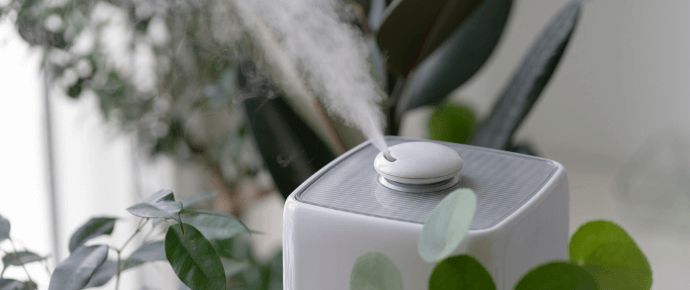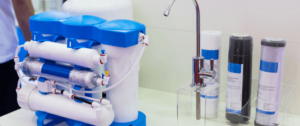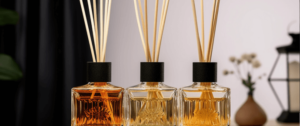The winter wind howls and your skin cries out for relief. The dry air makes every cough sound like an orchestra of wheezing. When you get your humidifier out, there’s one thing that’s on your mind: can I use reverse osmosis water in my humidifier?
Can I Use RO Water in My Humidifiers?
Absolutely! In fact, RO water is typically regarded as the gold standard for humidifiers. Its purifying method eliminates up to 99% of contaminants such as minerals, chlorine, and bacteria, resulting in essentially demineralized water.
- No white dust: Mineral deposits are to blame for the annoying white film that accumulates on furniture and devices. RO water eliminates this problem, keeping your home clean and your humidifier working properly.
- Reduced scaling: Mineral buildup within your humidifier can block filters and shorten their life. RO water minimizes this risk, which saves you money on repairs and replacements.
- Cleaner mist: Because your humidifier does not include minerals, the mist it produces is purer and softer on your lungs, which is especially good for individuals who suffer from allergies or respiratory sensitivity.
- Longer lifespan: By reducing wear and tear from mineral accumulation, RO water can help your humidifier last longer, making it a beneficial long-term investment.
But wait, isn’t distilled water the best?
While both RO and distilled water are wonderful choices for humidifiers, there are some minor variations. Distillation removes all pollutants, including beneficial minerals, whereas RO leaves some trace minerals. This makes RO water slightly more suitable for long-term usage in humidifiers, as it reduces the risk of corrosion.
Is RO Water Right for Your Humidifier?
Most humidifiers thrive on RO water; however, there are a few factors to consider:
Humidifier Type: Ultrasonic and cool-mist humidifiers gain the most from RO water, although evaporative ones may not necessitate such high purity.
Your water’s quality: If your tap water is already relatively clean and low in minerals, you may not require RO water. However, RO has additional advantages, like microbial elimination and increased flavour.
Cost: RO systems are an investment, so balance the benefits and potential savings on humidifier maintenance.
Professional Tips for Using RO Water in Your Humidifier:
- Change the water frequently: Even when using RO water, bacteria might form in the humidifier tank. Water should be changed daily, and the tank should be cleaned on a regular basis, as directed by the manufacturer.
- Use a filter: Some humidifiers include built-in filters that can help extend the life of RO water. Check the handbook and replace filters as needed.
- Maintain your RO system: Regular maintenance of your RO system ensures that it runs smoothly and produces high-quality water. Follow the manufacturer’s recommended maintenance schedule for your specific system.
Is it okay to use reverse osmosis water in a humidifier?
Yes, utilizing reverse osmosis (RO) water in a humidifier is completely safe and a superior option to distilled water. RO water goes through a filtration process that removes up to 98% of contaminants like minerals, salts, and germs. This reduces mineral accumulation and white dust, resulting in smoother functioning and less cleaning.
Can I use reverse-osmosis water instead of distilled water?
Absolutely! Humidifiers can be filled with either RO or distilled water. While distilled water is mineral-free, its mild acidity may erode some humidifier components over time. RO water preserves certain essential minerals, making it somewhat preferable for long-term consumption.
Can I use reverse osmosis water in my diffuser?
Yes, RO water is suitable for diffusers as well. Its low mineral content, similar to that of humidifiers, minimizes clogging and buildup, allowing your essential oils to diffuse properly.
What is the disadvantage of reverse osmosis water?
While RO water has several advantages, it’s vital to remember that:
- Wastewater generation: RO systems generally produce wastewater in addition to purified water. This can be an environmental issue, particularly in locations with limited water resources.
- RO systems and new filters are more expensive to purchase than distilled water alone.
- Not suitable for all contaminants: While RO filters effectively remove most minerals and organic contaminants, they may be ineffective against certain chemicals and volatile organic compounds (VOCs).
Is purified water better than distilled water for a humidifier?

Technically, distilled water is the finest choice for humidifiers because it has no minerals or salts. However, RO water comes close due to its high purity and other benefits such as trace mineral retention. Ultimately, both are safe and productive options.
Is it OK to use a humidifier without a filter?
No, it is not suggested that you use a humidifier without a filter. Humidifier filters remove pollutants and microorganisms from water, preventing them from becoming aerosolized and breathed. Using an unfiltered humidifier can bring toxins and allergens into the air, reducing air quality and possibly causing respiratory problems.
Can you put salt in a humidifier?
Adding salt to a humidifier is generally not advisable. While some users claim it alleviates congestion, there is no scientific proof to support this. Furthermore, salt can erode the humidifier’s interior components, leaving a white film on nearby furnishings. If you want a natural decongestant, try adding essential oils such as eucalyptus or peppermint to your diffuser instead.
How do you make purified water for a humidifier?
There are two major ways to produce filtered water for your humidifier:
Distillation is the process of boiling water and condensing the resulting steam, which removes most contaminants. While efficient, it can also be time-consuming and energy-intensive.
Reverse osmosis filtration employs a semipermeable membrane to remove dissolved pollutants. It is usually faster and more convenient than distillation, although it requires an RO system.
So, can you use reverse-osmosis water in a humidifier?
The answer is an emphatic yes! It’s like having access to a crystal-clear mountain stream from the comfort of your living room—no white dust, mineral deposits, or corroded components. Pure, refreshing air that pampers your skin, relaxes your sinuses and whispers lovely lullabies into your sleep.
However, the advantages of RO water extend beyond a perfectly clean humidifier. It tells stories of a planet you’re preserving by reducing wastewater. Instead of making endless trips to the food store, you’re making your wallets fatter. Of the lungs, you’re grateful for the clean air they get to breathe.






Leave a Reply